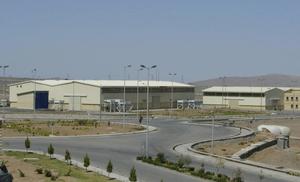 This file photo taken on March 30, 2005, shows a general view of the Iranian nuclear power plant of Natanz, 270 km south of the capital Tehran.
(HENGHAMEH FAHIMI / AFP)
This file photo taken on March 30, 2005, shows a general view of the Iranian nuclear power plant of Natanz, 270 km south of the capital Tehran.
(HENGHAMEH FAHIMI / AFP)
DUBAI - Any US attack against Iran would face a "crushing" response, an Iranian government said on Tuesday about reports that US President Donald Trump asked for options for attacking Iran's main nuclear site last week but decided against doing so.
"Any action against the Iranian nation would certainly face a crushing response," spokesman Ali Rabiei said in remarks streamed on an official government website.
Citing a US official, Reuters reported on Monday that Trump, with two months left in office, conferred with top advisers about the possibility of attacking the Natanz uranium enrichment plant - but was dissuaded by them from that option.
Trump made the request during an Oval Office meeting on Thursday with his top national security aides, including Vice-President Mike Pence, Secretary of State Mike Pompeo, new acting Defense Secretary Christopher Miller and General Mark Milley, chairman of the Joint Chiefs of Staff,
the official said.
Trump's request for options came a day after a UN atomic watchdog report showed that Iran had finished moving a first cascade of advanced centrifuges from an above-ground plant at its main uranium enrichment site to an underground one, in a fresh breach of its nuclear deal with big powers
The official confirmed the account of the meeting in The New York Times, which reported that the advisers persuaded Trump not to go ahead with a strike because of the risk of a broader conflict.
"He asked for options. They gave him the scenarios and he ultimately decided not to go forward," the official said.
The White House declined comment.
ALSO READ: US envoy sees new Iran sanctions, no military action
Pompeo is on Wednesday due to visit Israel, which has long hinted at possible military action against its arch-enemy Iran.
"If I were the Iranians, I would not feel at ease" after the report, Israeli Energy Minister Yuval Steinitz said, adding that
he was not aware of the Oval Office deliberations last Thursday.
"It is very important that the Iranians know that if, indeed, they suddenly dash toward high levels of enrichment, in the direction of nuclear weaponry, they are liable to encounter the military might of the United States - and also, perhaps, of
other countries," Steinitz told Israel's Army Radio.
Iran says its nuclear programme is for peaceful needs. Rabiei accused Israel of "psychological warfare" against Iran.
"I personally don't foresee that it's probable that they (the United States) would want to cause insecurity in the world
and the region," Rabiei said.
ALSO READ: UN: Targeted killing of Iran's Soleimani by US armed drone unlawful
Trump has spent all four years of his presidency engaging in an aggressive policy against Iran, withdrawing from the Iran nuclear deal negotiated by his Democratic predecessor, Barack Obama, and imposing economic sanctions against a wide variety of Iranian targets.
His request for options came a day after a UN atomic watchdog report showed that Iran had finished moving a first cascade of advanced centrifuges from an above-ground plant at its main uranium enrichment site to an underground one, in a fresh breach of its nuclear deal with big powers.
Alireza Miryousefi, spokesman for Iran’s mission to the United Nations in New York, said Iran's nuclear program is purely for peaceful purposes and civilian use and Trump's policies have not changed that.
"However, Iran has proven to be capable of using its legitimate military might to prevent or respond to any melancholy adventure from any aggressor," he added.
Iran's 2.4-tonne stock of low-enriched uranium is now far above the deal's 202.8 kg limit. It produced 337.5 kg in the quarter, less than the more than 500 kg recorded in the previous two quarters by the International Atomic Energy Agency.
In January, Trump ordered a US drone strike that killed Iranian military General Qassem Soleimani at the Baghdad airport.
But he has shied away from broader military conflicts and sought to withdraw US troops from global hotspots in keeping with a promise to stop what he calls "endless wars."
Trump, who is challenging the results of the Nov 3 presidential election, is expected to hand over power to US Democrat Joe Biden on Jan 20.
A strike on Iran's main nuclear site at Natanz could flare into a regional conflict and pose a serious foreign policy challenge for Biden.
Biden's transition team, which has not had access to national security intelligence due to the Trump administration's refusal to begin the transition, declined comment.


